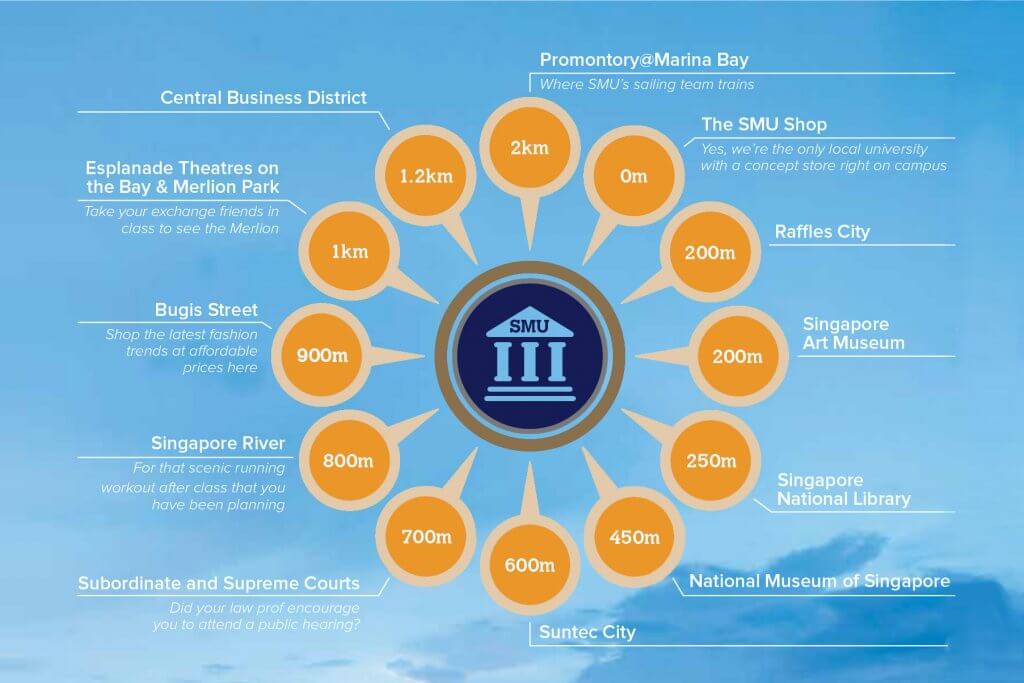By the SMU Social Media Team
Choosing which university to attend is a huge decision. Most people start with the academic course they’re most interested in and take that as the primary (or only) criterion. But consider for a moment that you’re not just choosing a field of undergraduate study—you’re also choosing your way of life for four entire years.
Here, we present the big areas of consideration for your university selection process, including some lesser-known but no less important criteria.
1. Field of study

It’s no secret that earning a university degree is a huge commitment of time and money, not to mention blood, sweat and tears. Do your research: read up on the programmes, visit the university admissions websites, talk to seniors from your JC/poly/secondary school, attend the open houses and ask all your questions. By the time you set your heart on a particular course, you should be able to explain to a total stranger in 10 minutes why it’s the right choice for you.
Obligatory reality check: depending on your grades, you may or may not stand a chance at entering your preferred programme in your preferred university. For SMU, you can refer to the previous year’s Indicative Grade Profiles to see how you stack up against last year’s freshies.
2. Location, location, location

For many decades, students seeking higher education in Singapore had to journey to the west. Today’s options include a full-featured campus right in the heart of the Downtown Core, located within walking distance of five different MRT lines.
If your preferred area of study is offered in more than one university, it’s worthwhile to think about location and accessibility among your other concerns. Travel time makes a big difference when you have classes that start at 9am! Consider also whether you have a direct bus to campus from home, or if the journey requires multiple bus/train/ bus transfers.
3. Campus culture and student life

Do you have a flair for the performing arts? Are you passionate about animal welfare? Or perhaps you’re into extreme sports. Given how much time the average undergraduate spends on campus, it’s a good idea to pick a university that supports your non-academic interests.
SMU has over 120 student clubs, so there’s a strong likelihood that there’ll be one or more that gels with your hobbies and talents. But even if there isn’t, you’re very welcome to set up a new club that does! Our clubs and societies are platforms not just for participation, but also leadership—many of SMU’s official events are run by the student clubs, which receive lots of support while operating very independently. And don’t be fooled by our seemingly smaller campus. Being right smack in the city means that our resourceful clubs have the option of actively making use of facilities on, off and around campus. Just ask the commuters who have walked out of Bras Basah MRT into our Concourse and come up against the SMU Kendo club at the foot of the stairs.
Besides co-curricular pursuits, you should also be able to identify with your chosen university’s vision, mission, and goals. SMU, for instance, is committed to an interactive, participative and technologically-enabled learning experience. Just ask any sophomore—he’ll tell you how freshman year transforms even the shyest wallflower into a confident, collaborative seminar participant.
4. Exposure opportunities

No matter how hard you study, there’s a natural limit to what you can learn from books alone. Internships will provide you with valuable on-the-job experience, but they can be hard to find if you don’t have industry connections. That’s why it’s important to pick a university that will help you to secure relevant internship experience during your school holidays.
Besides work experience, consider other exposure opportunities that will help you to thrive in this increasingly global economy. Global exposure trips such as study missions, overseas community service projects and exchange programmes are great ways to learn about the world beyond our shores while burnishing your CV and developing your professional and interpersonal skills.
Perhaps the experience of working while you study has ignited an entrepreneurial spark. While yesteryear’s titans of technology started their business empires by dropping out of higher education, today’s universities tend to be more encouraging towards students with these ambitions. Choose one that will support and journey with you on the road to being your own boss; better yet if it has a dedicated innovation and entrepreneurship institute with a proven track record of successful startup incubation.
5. Preparing for life after university
Yes, you’ve barely begun. But it’s never too early to start planning your long-term goals and prospects. With this in mind, here are some questions to consider in the course of your research.
- Does your preferred university provide career counselling and career planning advice?
- Does it have a systematic approach to imparting career planning and skills — including “soft” skills such as etiquette for business and fine dining?
- Does the career centre keep up to date on employment trends, particularly for the industry you hope to enter upon graduation?
- Besides classroom sessions that teach resume writing, are there opportunities for one-to-one sessions such as mock interviews?
Although some say that a university degree is no longer a guarantee of employment, we think that the right university experience is one that will build on your strengths and provide you with a good headstart—with the goal of making you a well-rounded and highly employable person in the not-so-far-off future.
Want to find out more? Undergraduate applications are open — visit admissions.smu.edu.sg to learn how you can Transform into a Different U.












